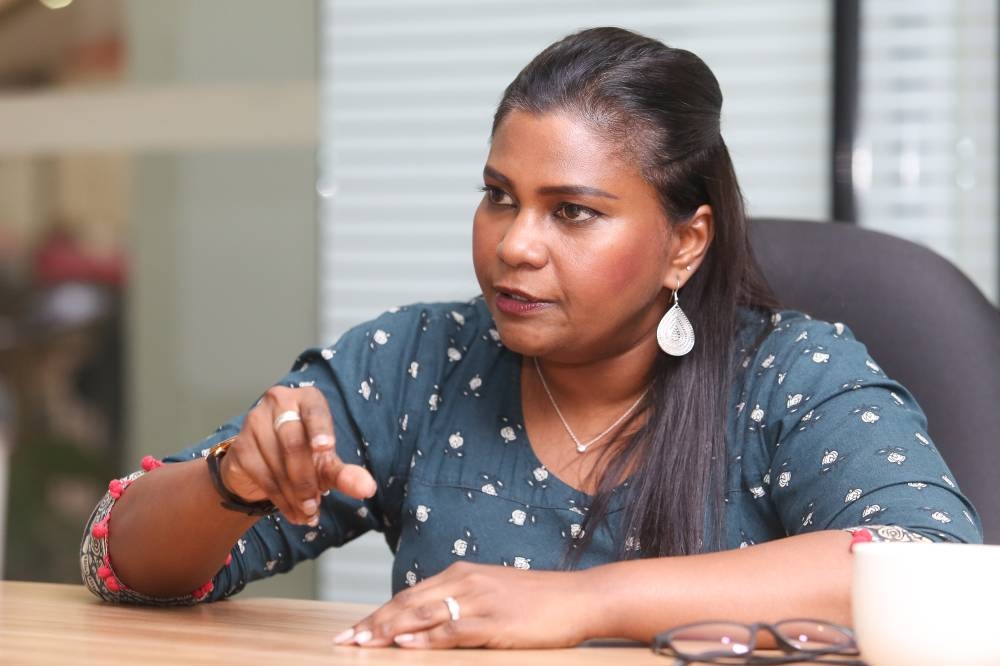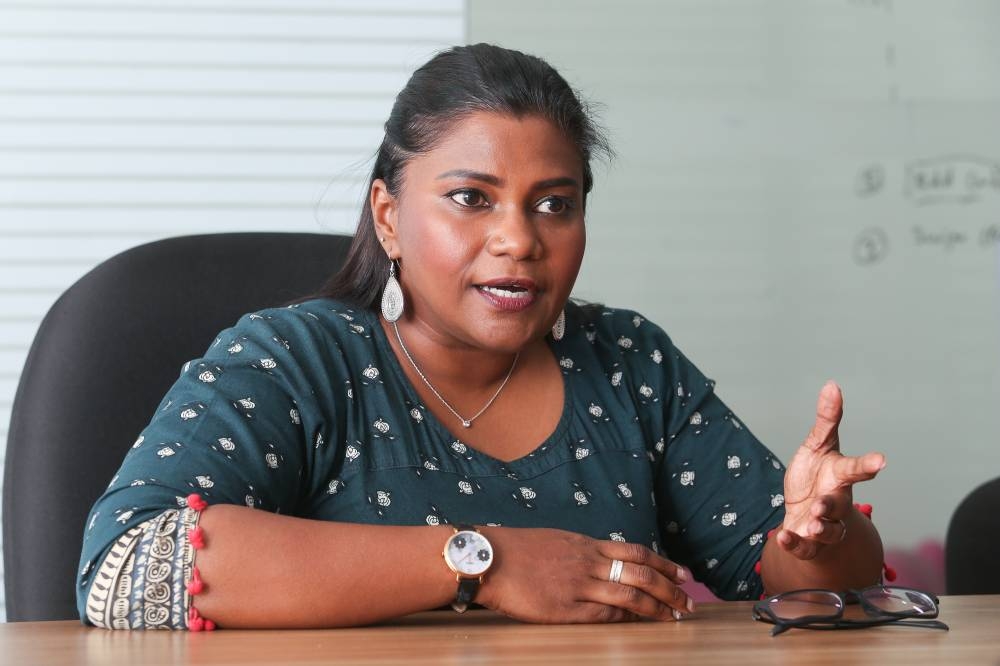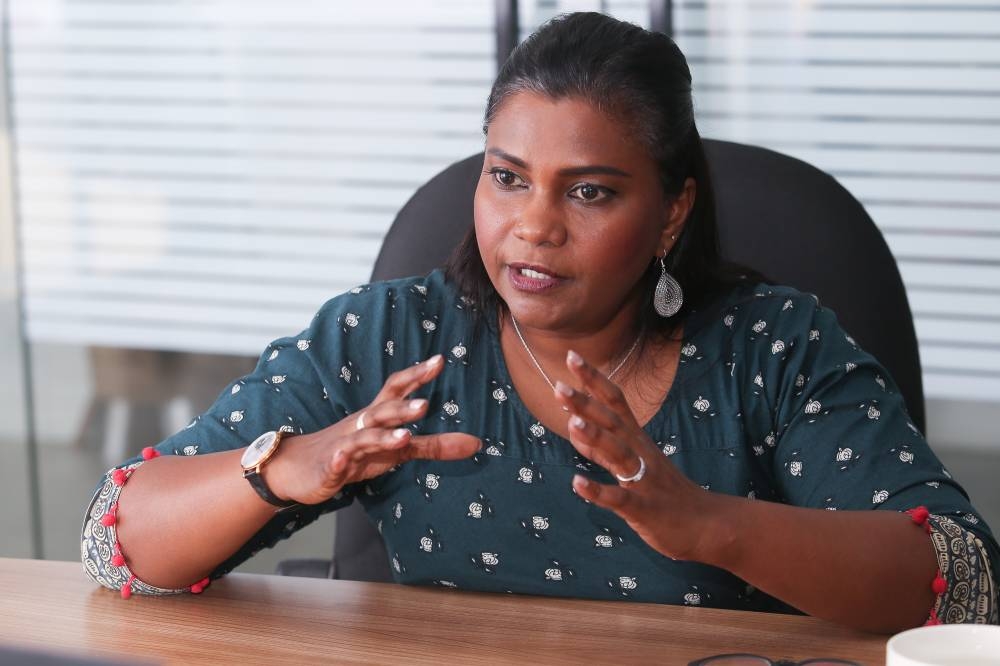KUALA LUMPUR, June 8 — The fight for a 30 per cent women quota in high-ranking positions and decision-making bodies is still relevant, as many “mediocre men” still dominate the space, Batu Kawan MP Kasthuriraani Patto said.
Speaking to Malay Mail, the daughter of the late legendary politician P. Patto, said that this was why the system was crucial to help capable and bright women earn their well-deserved spot to showcase their leadership talents.
Kasthuri lamented that society was also at fault for the problem.
“I think we have evolved from having no quota at all. Which means that women, even good, qualified women, were not given a platform or a space because mediocre men took that space up.
“As a society, we are also to blame because we never ask men and women the same question. When a woman is elected as a lawmaker, one of the first questions is: ‘Do you have children, and if yes, how are you going to manage your time?’ Do we ask male lawmakers the same question? We never do, but we ask women like Hannah Yeoh and Yeo Bee Yin that,” she said.
Kasthuri said this was the result of societal expectations and its conditioning about gender roles, which was also imprinted on women lawmakers, who faced policies of inequality.
She said that she fervently hopes and believes that the 30 per cent quota system — which she feels is not the most ideal — will no longer be around one day, once the concept of gender equality has been understood well and adopted thoroughly.
Currently, however, she reiterated that it is crucial to allow women to uplift one another and to challenge the stereotypical images and expectations faced by them.
“It is necessary at this time due to the situation and scenario and because women want to come out and show their worth. Creating a platform means putting yourself out there. You lean in and you say, ‘Look at me. This is what I have to offer but my glass ceilings are numerous compared to men.’
“First, they do not have glass ceilings. I have not just one but many glass ceilings over me. But I can work as hard if not harder. I can deliver the same, if not better. But I have limitations. So that’s why you have this minimum 30 per cent quota,” she said, adding that 30 per cent is the critical mass of what is needed for change to happen.
Gender gap
In its 2018 election manifesto, Pakatan Harapan (PH) had pledged to ensure at least 30 per cent of policy makers appointed at all levels were women. While some progress was made, it still fell short of the target.
Perhaps the staunchest critic of gender-based allocations is Tan Sri Rafidah Aziz, who denounced feminism in a forum in 2016, as she repeated her criticism of gender quotas.
The former international trade and industry minister claimed that Malaysia had been doing more than other countries to promote women’s development and told women to improve themselves.
She also rubbished the 30 per cent quota system for women.
“I hate this 30 per cent quota. Women are not quota fillers. Don’t degrade us just to fill quotas. Women should be considered for their competence and abilities. Don’t talk about numbers. Numbers don’t matter. Quality matters,” she added.
Rafidah also said women’s performance should not be measured by the number of female MPs, CEOs or board directors.
Last year, the Department of Statistics Malaysia (DoSM) released the Statistics on Women Empowerment in Selected Domains, Malaysia, 2021, reporting that overall gender equality improved to 71.4 per cent in 2020.
The Malaysia Gender Gap Index (MGGI) identifies the gap between women and men across four sub-indices encompassing economic participation and opportunity, educational attainment, health and survival and political empowerment. A score with a value of 1.0 (100 per cent) indicates the equality of women and men has been achieved.
Chief statistician Datuk Seri Mohd Uzir Mahidin said that the achievement of women surpassed men in the educational attainment sub-index with a score of 1.059. Health and survival sub-index recorded a score of 0.956, followed by economic participation and opportunity (score 0.738).
He said that the labour force participation rate (LFPR) for women was still low at 55.3 per cent in 2020 as compared to other South-east Asian countries, such as Singapore (69.7 per cent) and Thailand (66.8 per cent). Generally, women’s LFPR for developed nations exceeds 60 per cent.
Political empowerment recorded the lowest at 10.0 per cent (score 0.100) which means that women were still lagging behind men when it came to appointments for ministerial positions and representation in Parliament.
In its report, the 30% Club Malaysia, meanwhile, said that as of 2021, 26 per cent of women were in the top 100 public-listed boards.
The Malaysian chapter of the 30% Club was launched in May 2015 with the aim of improving diversity on the Malaysian corporate boards and senior management.
The 30 per cent quota system was announced by then prime minister Datuk Seri Najib Razak, who, in 2018, had even named the annum as Women Empowerment Year, to enable women to flourish in their careers and family lives.
Agree to disagree
Kasthuri said she disagreed with Rafidah.
“She was privileged. She started privileged in that position and she benefited from that privilege.
“Now, I can say I don’t need the 30 per cent because I am, to some extent, in my political arena, a bit privileged. I represent this ethnicity. I represent women. So maybe, even if there is no quota set, other women will look and say, ‘Oh, but she’s Indian, I must vote for her. Or that she is female, I must vote for her.’
“So I have a slight advantage there, and I come from a political family. But Yeo did not come from a political family, neither did Hannah. They all had to work hard.
“I totally understand the argument for the 30 per cent and the fear of whether we get unqualified women.
“However, even without the quota system, there are so many unqualified men who are holding positions and we never, ever talk about it. We have substandard leaders,” she lamented.
Kasthuri also pointed to Kapayan state assemblyman Jannie Lasimbang, whom she credited as being a fierce fighter for the rights of indigenous communities in Sabah.
She said while Jannie is not that well-known to peninsula voters, she is a familiar face in Sabah who was able to shine in DAP, owing to the 30 per cent quota allocation.
“With this 30 per cent, Jannie is now in the CEC (DAP’s central executive committee) and she will then bring the voices and the agenda of the indigenous people to the CEC,” she added.





















